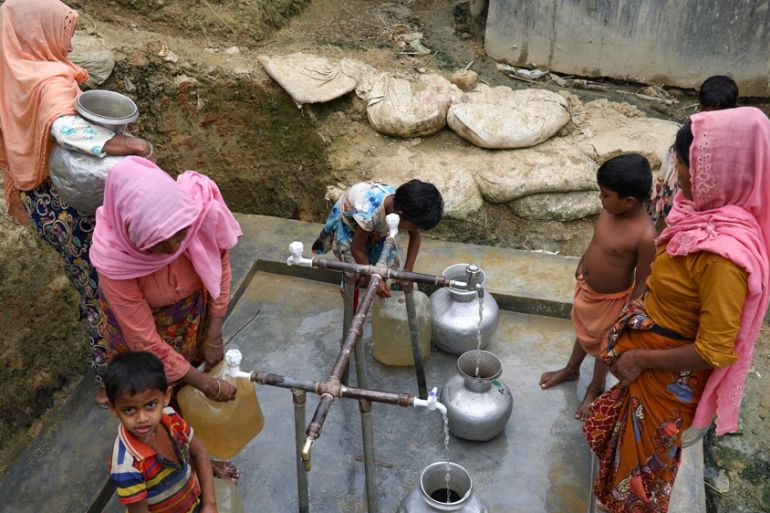UN panel condemns Myanmar army’s sexual violence against Rohingya
UN investigators say the scale of sexual violence against the Rohingya shows ‘genocidal intent’.

Sexual violence committed by Myanmar troops against Rohingya women and girls in 2017 was an indication of the military’s genocidal intent to destroy the mainly Muslim ethnic minority, United Nations investigators have concluded.
The UN Independent International Fact-Finding Mission on Myanmar said in a report on Thursday that the country’s soldiers “routinely and systematically employed rape, gang rape and other violent and forced sexual acts against women, girls, boys, men and transgender people”.
Keep reading
list of 4 itemsConflict, climate, corruption drive Southeast Asia people trafficking: UN
Bodies of three Rohingya found as Indonesia ends rescue for capsized boat
How is renewed violence in Myanmar affecting the Rohingya?
Its report on sexual and gender-based violence in Myanmar covers the Kachin and Shan ethnic minorities in northern Myanmar, as well as the Rohingya in the western state of Rakhine.
A military crackdown in Myanmar’s Rakhine State that began in August 2017 forced more than 730,000 Rohingya to flee to neighbouring Bangladesh, where they have been living since in overcrowded refugee camps.
Myanmar denies widespread wrongdoing and says the military campaign across hundreds of villages in northern Rakhine was in response to attacks by Rohingya fighters.
“Hundreds of Rohingya women and girls were raped, with 80 percent of the rapes corroborated by the Mission being gang rapes. The Tatmadaw (Myanmar military) was responsible for 82 percent of these gang rapes,” the report said.
The Myanmar government has refused entry to the UN investigators, who travelled to refugee camps in Bangladesh, Thailand and Malaysia, and met aid groups, think-tanks, academics and intergovernmental organisations.
The report, released in New York, charged that the genocidal intent of Myanmar’s military towards the Rohingya was demonstrated “by means of killing female members of the Rohingya community, causing Rohingya women and girls serious bodily or mental harm, deliberately inflicting on the Rohingya women and girls conditions of life calculated to bring about the destruction of the Rohingya in whole or in part, and imposing measures that prevented births within the group”.
“The Tatmadaw used sexual violence as a tool of their military tactics, it is very much part of their tactics,” Radhika Coomaraswamy, a member of the UN fact-finding mission, told Al Jazeera.
“But in the Rohingya areas, it was extremely violent and brutal to the point that we said that it showed a kind of intent to destroy the community.”
The report also condemned Myanmar’s failure to hold accountable the perpetrators of the abuses, noting that “such violence was only possible in a climate of long-standing tolerance and impunity, where military personnel had no reasonable fear of punishment or disciplinary action”.
‘No Rohingya wants to go back’
The release of the report on Thursday came as a new push to repatriate some of the Rohingya refugees fell flat, with no one turning up to travel on five buses and 10 trucks laid on by Bangladesh.
Bangladesh refugee commissioner Abul Kalam said none of the 295 families interviewed since Tuesday by the Bangladesh government and the UN’s refugee agency had agreed to return to Myanmar.
“Not a single Rohingya wants to go back without their demands being met,” he told reporters.
Rohingya have long demanded that Myanmar should give them citizenship, safety and their own land and homes they left behind.
Myanmar earlier said the repatriation would start on Thursday. The Buddhist-majority country has certified more than 3,000 refugees from more than 1,000 families as eligible for repatriation.
Bangladesh Prime Minister Sheikh Hasina said her government will not force the refugees to return and the repatriation will only happen if they are willing.
Myanmar has refused to recognise Rohingya as citizens or even as one of its ethnic groups, rendering them stateless.
Al Jazeera’s Stephanie Dekker, reporting from Kutupalong camp in Cox’s Bazaar, said this was not the first time authorities had tried to send back Rohingya refugees.
“One of the core issues is trust,” she said.
“I asked the member of China’s embassy and Myanmar’s diplomatic representative that why they were not giving journalists and the UN access to the areas where these people will be returning to,” she said.
“Because that is crucial as even the UN cannot guarantee anything to people here of what they will be facing on the other side.”
Many refugees have said they want to go back under direct UN supervision, not under the Myanmar government.